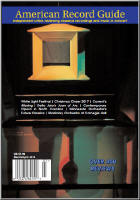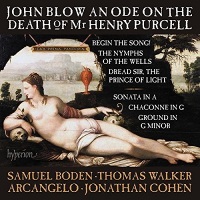Texte paru dans: / Appeared in: |
|
|
Outil de traduction ~ (Très approximatif) |
|
|
Reviewer: William
J. Gatens
John Blow (1649-1708) was
possibly the most gifted and imaginative composer of the English Restoration
period, second only to Henry Purcell. Blow was one of the first generation
of boy choristers recruited by Captain Henry Cooke for Charles II’s Chapel
Royal, and he remained there as an adult singer. Purcell was one of his
pupils, and the two remained close friends until Purcell’s untimely death in
1695.
Their relationship has been
compared with Haydn and Mozart. Blow was organist of Westminster Abbey and
relinquished the position in favor of Purcell in 1679. In 1697 he became
organist at Christopher Wren’s new St Paul’s Cathedral, but later
relinquished that post in favor of Jeremiah Clarke. Blow regarded himself as
primarily a church musician and wrote more than 100 anthems and 10 settings
of the Anglican service. As a court composer, he wrote about 40 odes of
various kinds and produced more than 120 secular and devotional songs as
well as the opera Venus and Adonis—the first English opera without spoken
dialog and a model for Purcell’s Dido and Aeneas. Despite his voluminous
output, Blow is known today for just a handful of works. One of them is the
Ode on the Death of Henry Purcell, which is the centerpiece of this
recording. It is modestly scored for two vocalists, two recorders, and
continuo, but is generally acknowledged to be the most exquisite of the
works written in memory of Purcell and, indeed, one of the finest
compositions of the period. Its text by John Dryden gives it a literary
distinction lacking in most odes of the time. I would guess that most listeners will be unfamiliar with the other pieces on this recording. They include three other odes. Begin the Song! is for St Cecilia’s Day in 1684. The annual celebrations began the previous year with Purcell’s Welcome to All the Pleasures, and one can hear Blow’s emulation of the younger composer’s work. The Nymphs of the Wells (1697) is a court ode for the eighth
birthday of William, Duke of
Gloucester, the son of Princess Anne and Prince George of Denmark. The child
was sickly and died three years later. In the Restoration court, New Year’s
Day was observed with a newly composed ode by a court poet and court
composer. Program annotator Bruce Wood describes such pieces as “not so much
high art as a kind of musico poetic political cartoon”. Dread Sir, the
Prince of Light, the New Year’s ode for 1678, has a rather dreadful text of
fawning flattery by an anonymous poet, but Blow’s music makes it worth
hearing. It would probably have been performed once and never heard again.
We are fortunate that this and many similar pieces by Blow and other
composers have survived. Three short instrumental works, placed between the
odes, complete the program: a chaconne in G, a ground in G minor, and a trio
sonata in A.
These are exemplary
performances by artists who seem to have a keen instinctive feel for the
idiom. In a few spots the strumming of the theorbo and baroque guitar sounds
raucous to me, but that is a small complaint. At first the recording sounded
excessively close, but after discovering a pleasant playback volume, the ear
adjusts. I was struck by the warmth of the recorded sound compared with
several other recordings of the Purcell Ode. Arcangelo is an instrumental
ensemble founded by their artistic director, Jonathan Cohen. They are
especially devoted to chamber music, cultivating a quality of collaboration
required for performance of the highest standard. | |
|
|
|
|
Cliquez l'un ou l'autre
bouton pour découvrir bien d'autres critiques de CD |
|




